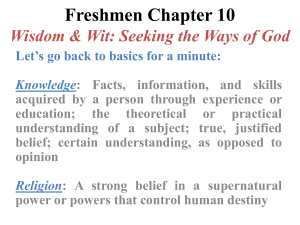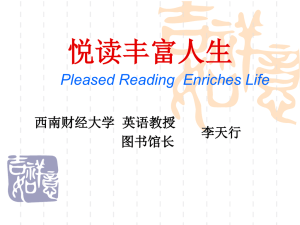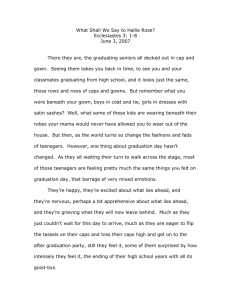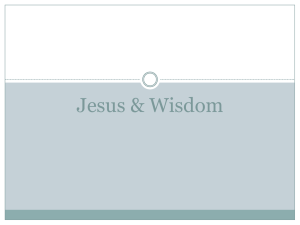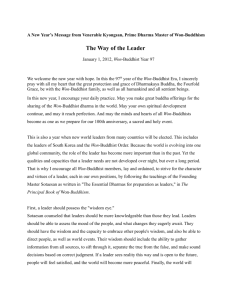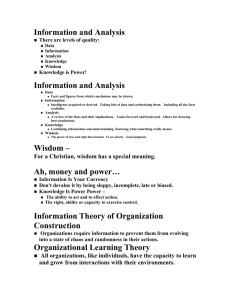Freshmen Chapter 10 Wisdom & Wit: Seeking the Ways of God
advertisement
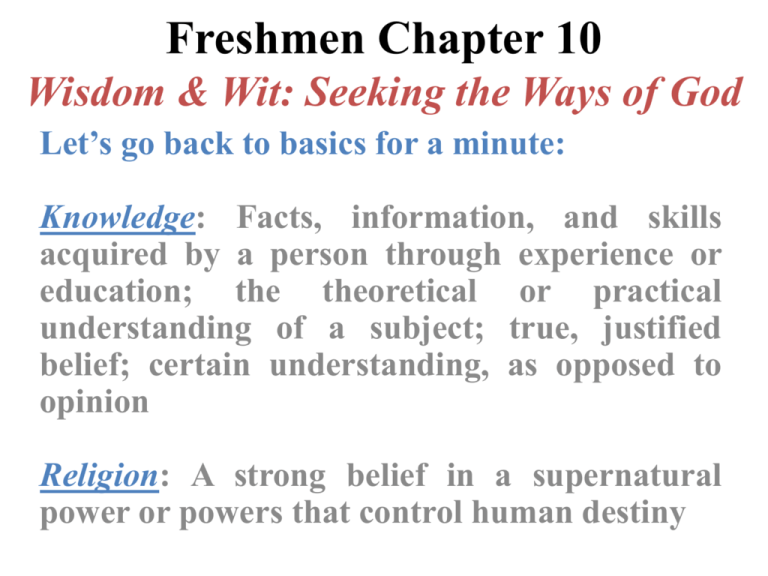
Freshmen Chapter 10 Wisdom & Wit: Seeking the Ways of God Let’s go back to basics for a minute: Knowledge: Facts, information, and skills acquired by a person through experience or education; the theoretical or practical understanding of a subject; true, justified belief; certain understanding, as opposed to opinion Religion: A strong belief in a supernatural power or powers that control human destiny • A synonym for failure is fiasco: A thing that is a complete failure, esp. in a ludicrous or humiliating way • Success: A person or thing that achieves desired aims or attains prosperity Which do you want to be? • Now we turn to a variety of Old Testament texts written at various times after the Babylonian exile • The authors of these books tried to answer these questions: What does it mean to be a wise person? What is the meaning and purpose of life? Where are we going? Why do good people suffer and bad people prosper? Why should we be good in a world that is unfair? How can we live good and faithful lives when surrounded by those who are hostile to our beliefs? • The Book of Proverbs appeared sometime after the Babylonian exile during the period when the second, primitive temple was being built in Jerusalem • It contains collections of wisdom teachings oriented toward teaching the young • Parts of The Book may date back to the time of King Solomon • It is concerned with how to live a good life • It is full of down-to-earth, practical advice • How to live a good life according to The Book of Proverbs: (See pg 246 ff) – Discuss one @ a time Parenting Communicating Attitudes Manners at court Work Conducting Business Reputation Leadership Gossip Learning Relationships with neighbors • Notice the literary device used in wisdom sayings: the same thing is said twice in two different ways, ex “Misfortune pursues sinners, / but prosperity rewards the righteous” • The teachers says the first part of the saying and the students respond with the second part • In the original Hebrew it would have been even more fun with the clever word plays and sounds unique to the Hebrew language • According to The Book of Proverbs, success & prosperity in this life, gained fairly, are the reward for a virtuous life Watch video “The Book of Proverbs” • Notice the focus in Judaism on rewards for being good come in this life not in the afterlife as in Christianity • Honor, dignity, and a good name are a person’s memorial – there is no hint of an afterlife in Jewish theology • If pressed, Rabbis talk about a “collective” afterlife with God in heaven but there is no notion of an individual afterlife with God • Where is God in all this wisdom? – most of the sayings do not mention God • The perspective of the Jewish sages (“sage” means a “wise teacher”) was that true wisdom is from God, no matter where we find it – even in other cultures with their appealing wisdom sayings • The sages saw the world as full of God’s wisdom so it is not surprising that the sages looked to the everyday experiences of the world to find wisdom • The Book of Proverbs often portrays the image of God’s wisdom as a woman and adds a feminine voice and quality to the traditional image of God as masculine and this feminine image of wisdom has been called “Lady Sophia” after the Greek word for wisdom • God is pure spirit – neither man nor woman • God is personal, but transcends the human categories of gender • The Old Testament writers used the terms “male” and “female” because that’s that they knew from their everyday experience • Catholic tradition has often read the passages on Wisdom in the Old Testament as related to Mary, the mother of God. • Mary is called the “Seat of Wisdom” in some prayers in the Catholic liturgy • Read together “Ecclesiastes: Is Life Lived in Vain?” on page 250-251 • Read together “Wisdom: What is Our Final Destiny” on page 252 • Read together “Afterlife” on page 253 • Watch “Life After Death - a Jewish View“ • From the Book of Job: Why do the Good suffer? • The dilemma of why the good suffer and the wicked prosper in this life is known as “the problem of evil” – and it is a very real problem • Read together in class the section beginning on the lower right side of page 249 and continuing on page 250 up to the section entitled "Ecclesiastes” • Watch video “The Book of Job” parts 1 thru 3 • Read together “The ‘answer’” on page 250 • Read together “Ecclesiastes: Is Life Lived in Vain” on pages 250 to 251 • Watch “Turn! Turn! Turn! Ecclesiastes In Music” • Watch video “Ecclesiastes” 1 thru 10 • The Experiences of John Newman as a Prelude to the Book of Wisdom: read together on page 252 • The Book of Wisdom: – Also called The Book of Solomon – Written in Alexandria, Egypt – Writer was a scholarly Jew – Struggles with the problem of Evil – Says our reward is in the afterlife – Contrasts fate of rich with fate of the just • Watch videos “The Book of Solomon” # 1 – 6 • Later Jewish writers assert that the soul continues to exist after the physical death of the body • Read together “Afterlife” on page 253 together in class • Read together “The Prayer of Israel: Hope of Immortality” on page 253 • The Book of Sirach: an alternative approach to Jewish history • The Book of Sirach, written by Jesus ben Sirach of Alexandria, Egypt, focuses on Israel’s history • The collection of “Wisdom Books” were written at various times after the Babylonian exile when Israel was surrounded by various foreign cultures: Watch Sirach Chapter #1 • He focused on wisdom as coming from God, not from Greek philosophy and thought Stories of Encouragement: Faith, and Goodness Triumph • Read the left column of page 257: tales told after the Babylonian exile • The book of Tobit was written about 200 BC but its story is set 500 years earlier during the Greek occupation • Tobit is the ideal, loyal Jew • Watch videos “The Book of Tobit” # 1 & 2 • During the Assyrian occupation, Tobit would bury the Jewish dead at his own cost • Read together “Tobit: the Faithful Jew” on pages 257 – 259 • These stories are meant to tell educational tales • The next is the Book of Judith which talks about courage in the fight to save Israel and the Temple • Watch videos “The Book of Judith” # 1 & 2 • Judith represents both courage and piety but also the use of deceit in a good cause • Read “Judith” in our textbook on page 260 • The Book of Esther – the story of a fictitious, timid woman who “tries out” to be queen and is selected by the King but who does not reveal that she is Jewish • The following is a simplified version of the story • She learns of a plot by the Prime Minister, Haman, to kill her and all Jews but when she appears before the King and Haman she faints • When Ester later again appears before the King and Haman, she tells the King of the plot and the King orders Haman hanged • The Jewish feast of Purim is held to celebrate the courage of Esther • Watch video “The Book of Esther” • Watch video “Purim - The Story and the Holiday” STOP

